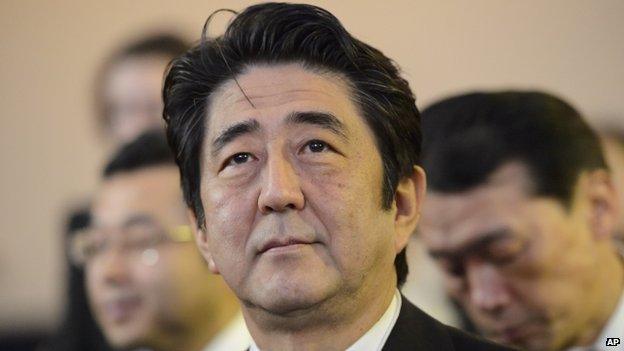Davos: What Abe said
- Published
- comments

Mr Abe sees China's military build-up as provocative
So here I am, again, on the top of a Swiss mountain, surrounded by the world's wealthiest and most powerful.
And, as per normal, I am suffering from mild altitude sickness.
Here is a typical (and true) conversation with a random stranger sitting in the partners' lounge of the Davos congress centre.
"Where are you from? Your badge says India."
"Well, I sit on the board of a big Indian institution, but I am a former minister of a Eurasian state, and I now have US citizenship, but I manage my money from a family office in London."
Yikes. I didn't ask the size of the fortune, but the phrase "family office" speaks to non-trivial sums: the turmoil and wealth-creating opportunities of the globalised world, since the collapse of communism, captured in a social introduction.
And before you ask, I inserted the catch-all "Eurasian" to protect the anonymity of said member of the global plutocracy (them is the rules of the World Economic Forum).
As for the rest of my day so far, I have nattered to a FTSE 100 chairman, two FTSE 100 chief executives, two heads of big City institutions, a Middle Eastern philanthropist, a hedge-fund superstar and a government head.
And all meetings were serendipitous.
So, amidst the hand-wringing about what they all see as the UK's growing isolation from the EU (Davos person is genetically pro-European) and bullishness about the UK's economic recovery, in just four hours I have gathered enough story leads to keep me occupied for some time.
For a journalist of my eccentric interests, Davos is like being let loose in the sweetshop.
More impact
What is on the minds of these eminences?
Well, the most interesting conversation so far was an (unusual) on-the-record briefing for a few hacks by Japan's Prime Minister, Shinzo Abe.
Why was this gripping (and a bit scary)?
Well, he volunteered that Japan's current bad relations with China are redolent of the relationship between Britain and Germany 100 years ago, or shortly before World War 1.
Which is the sort of thing you would expect clever-clogs commentators to say (in fact they do say this), but it has more impact (ahem) when said by Japan's leader.
And, indeed, he elaborated.
He recognises that - just like Britain and Germany in 1914 - Japan and China are inter-dependent economies, trading partners with huge mutual interests.
Peace would therefore be the bulwark of their prosperity and that of the region.
But he was explicit that he saw the 10% per annum increase in China's defence budget as a provocation.
As for his controversial visit to the Yasukuni shrine, there was explanation, but no hint of regret or apology. Mr Abe simply insisted that China was wrong to see him as honouring a small number of "war criminals". Instead, he was paying respect to the "souls" of millions of other genuine Japanese war heroes.
And, by the way, Japan's title to the Senkaku Islands, which China disputes, is unimpeachable (or so Mr Abe said).
Given that Mr Abe says he wants peace with China and fears there could be "accidents" that shatter it, I asked him if he had a road map or plan to de-escalate the tension
Not while China pursues its military build-up, he said.
Which left me with a hollow feeling that is somewhat characteristic of encounters in this rarefied place.